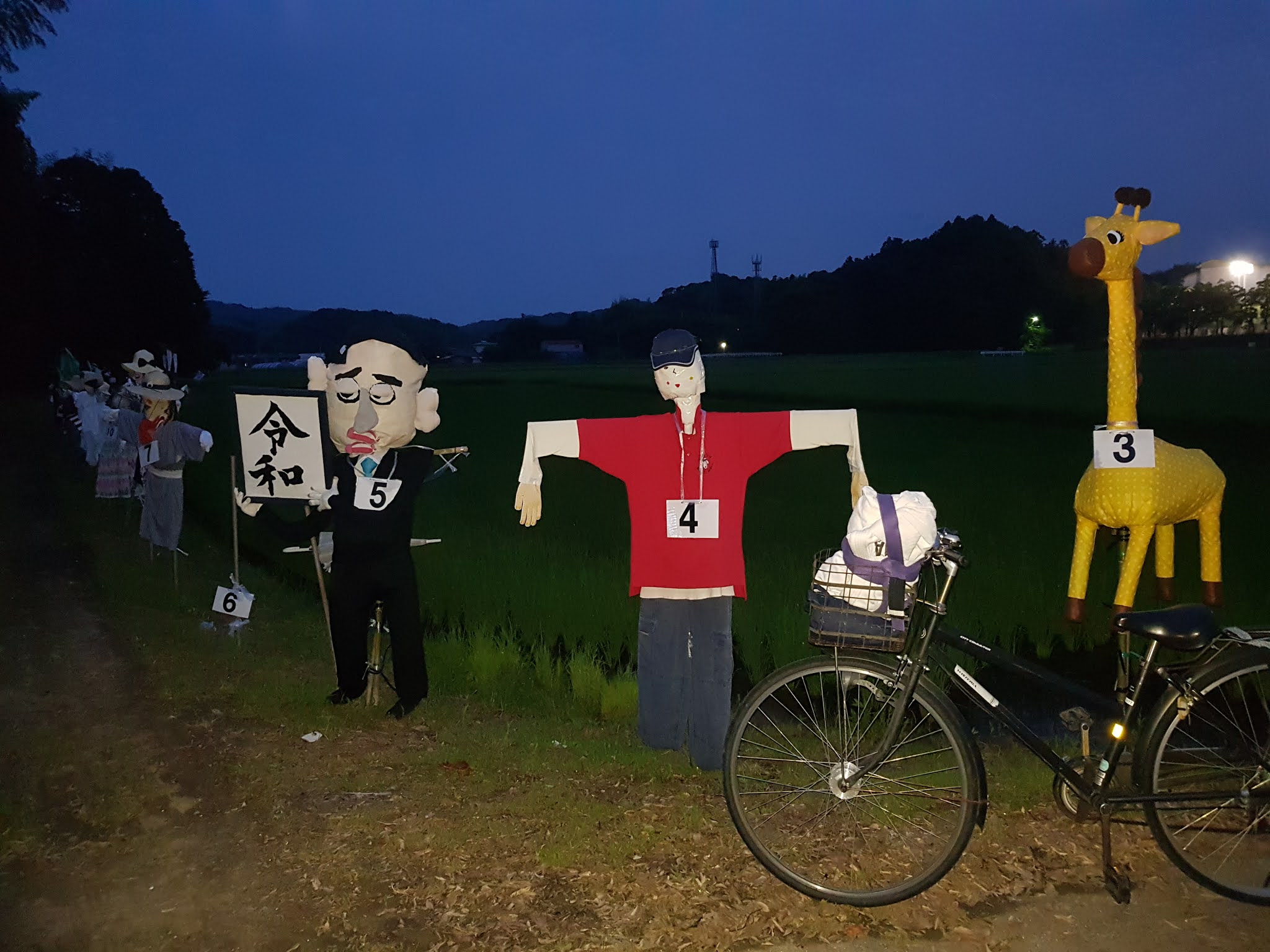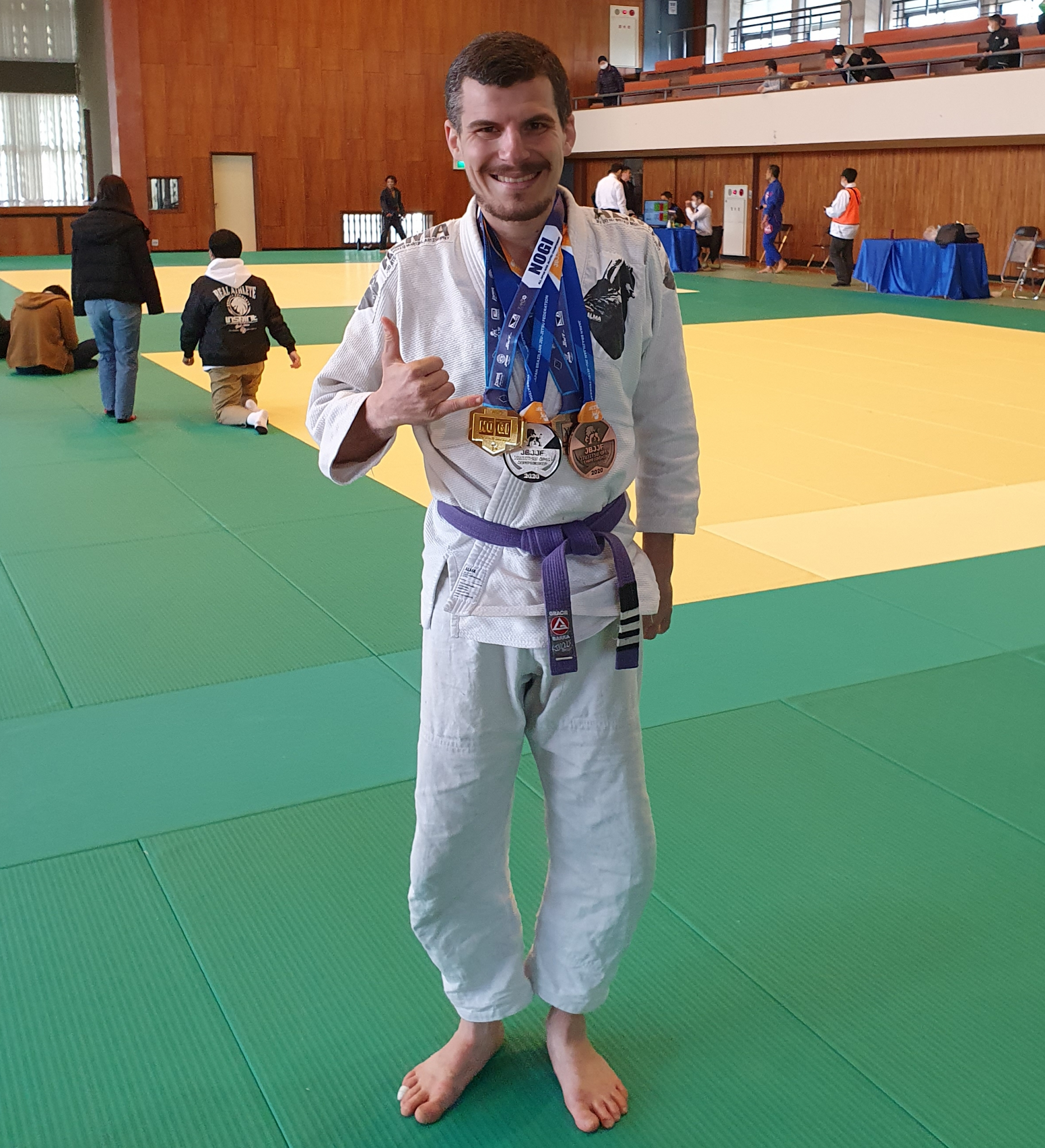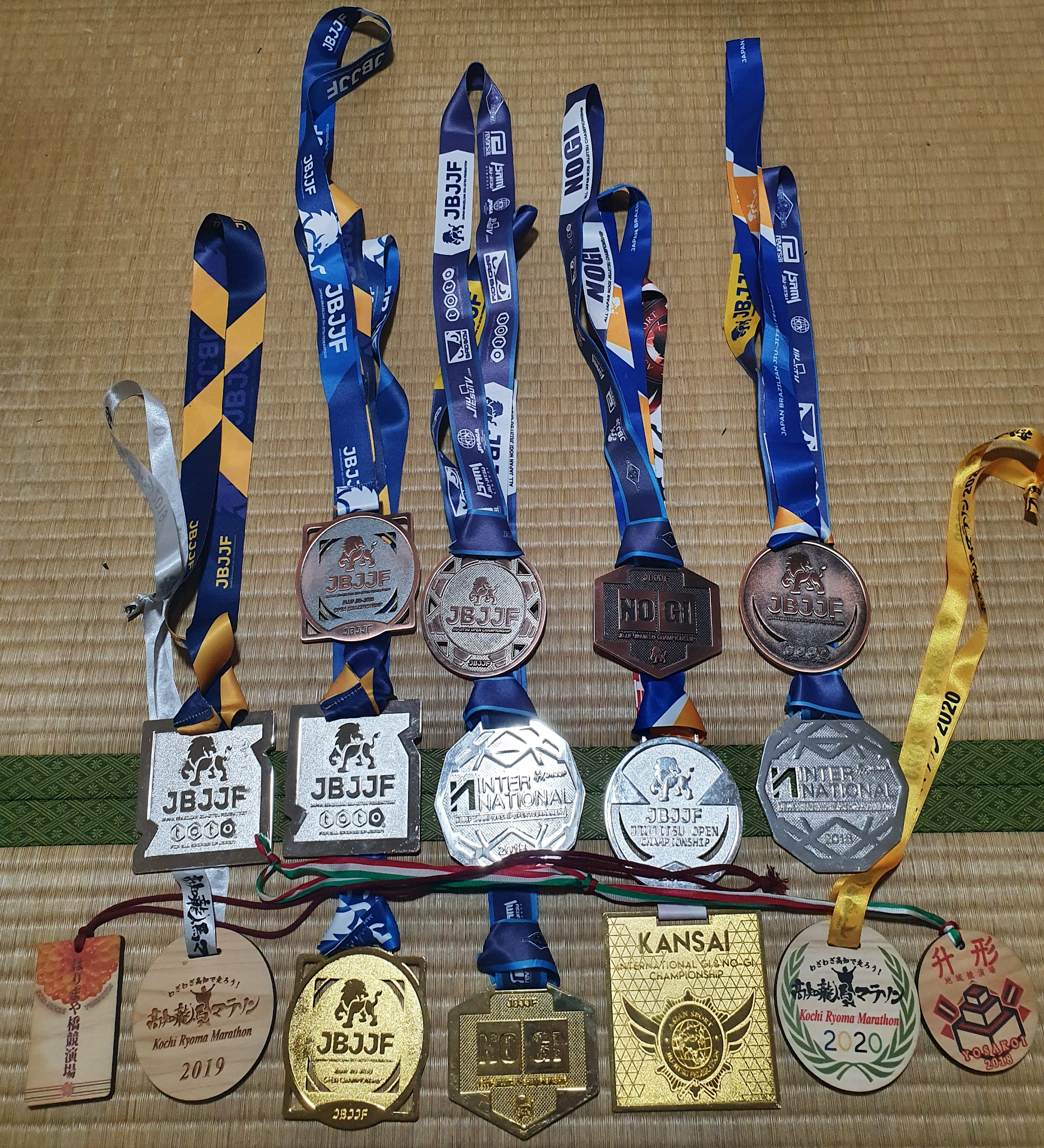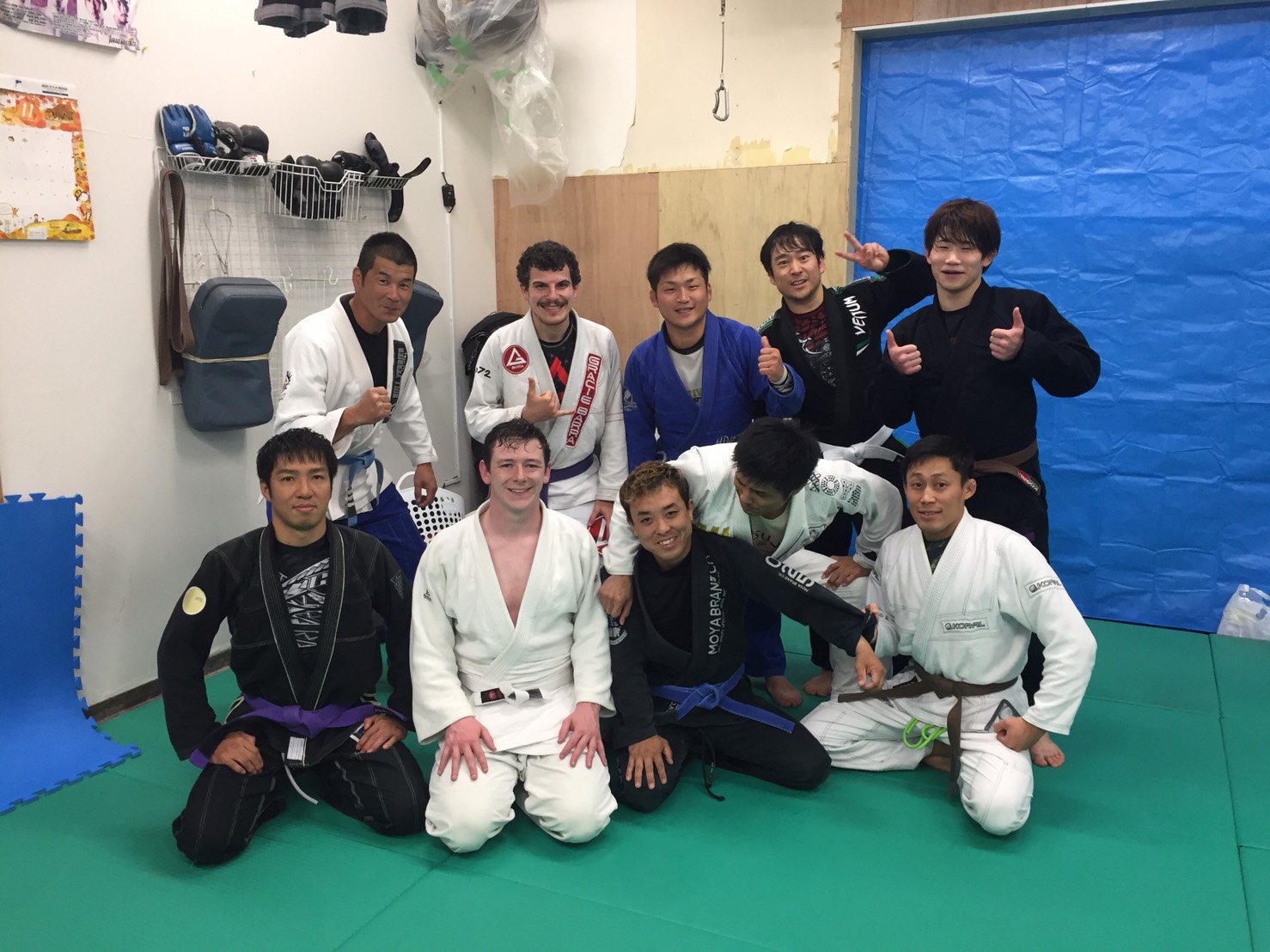I have been looking forward to writing about my experiences training Brazilian Jiu-Jitsu in Rural Japan for a while now. For those who do not know, Brazilian Jiu-Jitsu is a self-defence martial art focused on grappling, submission holds, and chokes.
The martial arts originated in traditional Japanese Jiu-Jitsu and Judo. It made its way towards Brazil, the martial art we know today. Without question, I have never been more embraced by a community than the BJJ community, not only by my wonderful team in Sydney, Gracie Barra Bondi, but also throughout the world, where I have had the privilege to train at dozens of different schools. I talked a lot about communities in the last article and intentionally excluded my experiences training with my BJJ team in Kochi. I have so many learning experiences, achievements, admiration and respect which I wanted to share that it needed a full blog post. In this article, I want to focus on what it was like to train Brazilian Jiu-Jitsu in Rural Japan.
I started training Brazilian Jiu-Jitsu about seven years ago with my team in Sydney, so when I decided to move to Japan, I was worried that I couldn’t keep training the hobby I love. Before I arrived in Kochi, I first searched for “BJJ schools in Kochi Japan”, and I saw two schools in the city, so I was very happy! Although I was not spoiled for choices like Sydney, where there are over 50 gyms, the most important part was that I could continue training and not give it up. The first gym I went to seemed not to be open, so I went to my first training with Ichiryo Gusoku (一領具足). Just as some historical background, in peacetime, Ichiryo Gusoku lived as farmers engaged in working the land. However, once the feudal lord mobilized them, they were supposed to respond at once with Ichiryo (one set) of Gusoku (weapon, armour). They were a group of farmer-samurai who served the
Chōsokabe clan of Tosa Province.
 |
Team photo at our Dojo in Haruno
|
Our team trains in two locations. Typically, our team practices at our base Dojo in Haruno, known for its farmland area. Our Dojo is beautifully decorated with fight posters, our trophies, weights, and a photo wall with a Polaroid with all our pictures. It is not the biggest training space, facilitating 2-3 rolls at one time, but it was perfect for our needs, and its intimacy allowed for mateship between each other. And outside the window, all you could see was farmland and a dirt road, and that was it. There was no one around our gym besides the sound of cicadas, and it is where we would train between 8-10 pm. As I did not own a car, I rode my bicycle to the Dojo to practice. Typically, it took 50 minutes to arrive and 50 minutes to return to my apartment. Additionally, I had to go through a mountain, 20 minutes walking my bicycle up the mountain. It was freezing in the winter and brutally hot in the summer. It was the only gym in Kochi I could practice at, so I felt very lucky I had a place to train.

When I was a white belt, my professor told me a very meaningful message that stuck. When you want to train, it does not matter how far you need to go or what you must do to get there. You will make it work. And I made it work. Once a week, we trained at a High School, and we can use their very large wrestling mats, which is a wonderful treat. It was the first time I met the team, coming to practice at the High School, and I remember before I opened the doors to the wrestling mats, I saw the diet of the High School wrestlers, which was eggs, protein and rice. I contacted Kadoya Sensei to come to attend this training, and on the mats, I was greeted by Doi Sensei. At the time, they were both brown belts. They were so welcoming and kind to me on my first day with the team, and I could tell this team meant serious business. I love training with different teams, as their styles are always different from what I am used to, making it more interesting. We only started standing when we started a spar and typically rolled for 6 minutes. And we rolled that day for 2 hours, and I joined the team on the spot. A special memory I was so happy to be a part of was when Kadoya Sensei and Doi Sensei got their black belt.
 |
End of Year Yakiniku party
|
On Saturday Night, we had a special event with visiting teams from nearby prefectures, and some high-level black belts came as well. There must have been about 30 people joining us that night, and I felt like a kid in a candy store. It was an amazing night of rolls, followed by a presentation ceremony where Kadoya Sensei and Doi Sensei was awarded their black belt. It was wonderful to see; they became the first black belts in our club, so it was an important moment in our club’s history. And we proceeded to all go out together for food and hang after. As the only foreigner at the event, many people are excited to roll with me, which I take as a compliment. I learnt an important lesson while I was training in Japan, which can be illustrated on this night. As I was consistently rolling with new people, different training partners, and people who came to train with me to sometimes “prove themselves”, all I could do was have faith in my abilities. I know what I can do. So, I need to trust myself and show what I can do. If things do not go my way, that is fine because I know what I can do and can also learn what I cannot do. So rather than get stuck up and scared in rolling with a constant barrage of new people, I can just relax and have faith that everything will be okay.
 |
Kadoya Sensei and Doi Sensei receiving their Black Belt
|
The classes and training with Ichiryo Gyusoku was very different to what I was used to. A bit less structured, more laid-back, and a strong focus on hard training. I remember I would come into the gym, and we would start with a 40-minute spar or a shark tank (You are in a circle, and every 2 minutes, a new person spars with you) or 100 set rounds of a series of exercises. It was really brutal on some days, but it made me stronger.
 |
Strong Boys!
|
Additionally, in Japan, I find the size of the opponent to be a bit more similar to my own body weight, with a distinct higher focus on technique, so it was very good for my BJJ to train with people of similar body weight my own, and sharpen my skill set. Although I did miss the rush of training with much larger opponents and using what I have learnt to defend myself. Ichiryo Gyusoku did a lot for me while I was living in Kochi, but they did the most when they did nothing. I talked a lot in the last blog about communities, and in Rural Japan, there is a feeling of being the outsider or "not fitting in" as you walk around. Although I was the only foreigner in Ichiryo Gyusoku, I never felt like an outsider. I was a member of the team like every single other person, and I could fit right in, doing all the brutal training with everyone else, not given any special privileges. I was included, looked towards as someone my team could rely on to provide advice and support to the newer team members, and given responsibilities to teach some of the club's children and be a functioning member of the club. How I felt within my society was overshadowed once I walked through those Dojo doors, and I felt it was a safe haven for me to be myself, relax, and enjoy the open environment that I was in. It was one of the few places or environments while living in Kochi where I didn't feel like a foreigner living in rural Japan and just another club member. This is because Brazilian Jiu-Jitsu transcends many barriers and differences between people and focuses on our common interest: a love and a passion for the martial arts we train. There is a strong companionship between one another and an unspoken community with everyone who trains to look out for each other with respect and become better at BJJ. Through this experience, it has strengthened my love of BJJ and everything that it has given me over the years. I have been fortunate to train in many different countries around the world, and to know there is always a place I can go to, even in rural Japan, is very special to me.

They slowly became a very special group of people, forming strong friendships, and I
would say I spent the most time outside of my schools, training with them 3
or so times a week and travelling to various competitions around Japan with
them by car. I remember one of the first competitions I did in Japan was in
Tokushima about two years ago, the Shikoku Competition, so we packed our cars and drove off. As the only foreigner competing, there was obvious intrigue
about how I would do. So as my name was called, I swear every person stopped what
they were doing and came along the side of the mats to watch my fight. The
guys smoking outside put out their cigarettes and rushed inside. All the
guys in the bathroom wrapped up and quickly came over. So a tad
daunting, but through the heart I showed in the fight and my fighting spirit,
I gained the respect of the crowd and got a nice cheer.
 |
|
Although I lost that
fight, I learned a valuable lesson I mentioned earlier. No matter
how you feel, or what obstacles you need to overcome, you can always have faith
in yourself and your abilities, and whatever challenges you come across, it
will carry you along. I could continue competing in Japan about once
every 3 months. I won a few medals along the way and gained more confidence in
myself, but it came full circle, where exactly one year later, at that same
competition where I lost my first fight, I pushed myself to get the gold medal.
I became Number 1 in my division in Shikoku and subsequently in the Chugoku Region
in another competition. Competing in Japan was one of my best experiences; we travelled together to many different prefectures and spent a lot of time on the road. I think by the end, I had competed in 7 or 8 competitions while living in Japan, so it was always a good learning experience for me. One weekend, we drove up to Osaka from Kochi, as 2 competitions were happening that weekend, so we decided to stay the night. Needless to say, it was one incredible weekend with fun hangouts, great experiences, and lots of BJJ. I was lucky to receive my first gold medal that weekend, so I was very proud of that achievement, and I look back on that weekend very fondly.
I am so grateful for the two years I spent with Ichiryo Gyusoku. I will look back on my fond memories, all the new experiences we shared together, and the wonderful times we had. I am so glad I had BJJ as a common link to meet such an amazing community while living in Japan and have this experience in my BJJ career. If that first gym I visited was open, who knows how things would have changed, but I am glad fate decided to have it closed, and I could train with Ichiryo Gyusoku.
Here are some additional photos and videos from my collection of 10,000 for your viewing pleasure

We were featured in the magazine Hot Kochi

One of the more interesting sites on the way to training

The Shikoku Tournament in Feb 2020

All the medals I won while in Japan

Post Competition Yakiniku

My friend who is a Judo Black Belt, came to join us one day
The night of the special ceremony
Fellow team mate and Judo Black Belt














Love reading about your experience, so inspiring Ari!
ReplyDeleteI live in Shimanto city Kochi prefecture. I'm interested in learning BJJ. Do you have the contact info for this dojo or one in Shimanto. Thanks!
ReplyDeleteI am so grateful for your blog.Really thank you! jiu jitsu belts
ReplyDelete